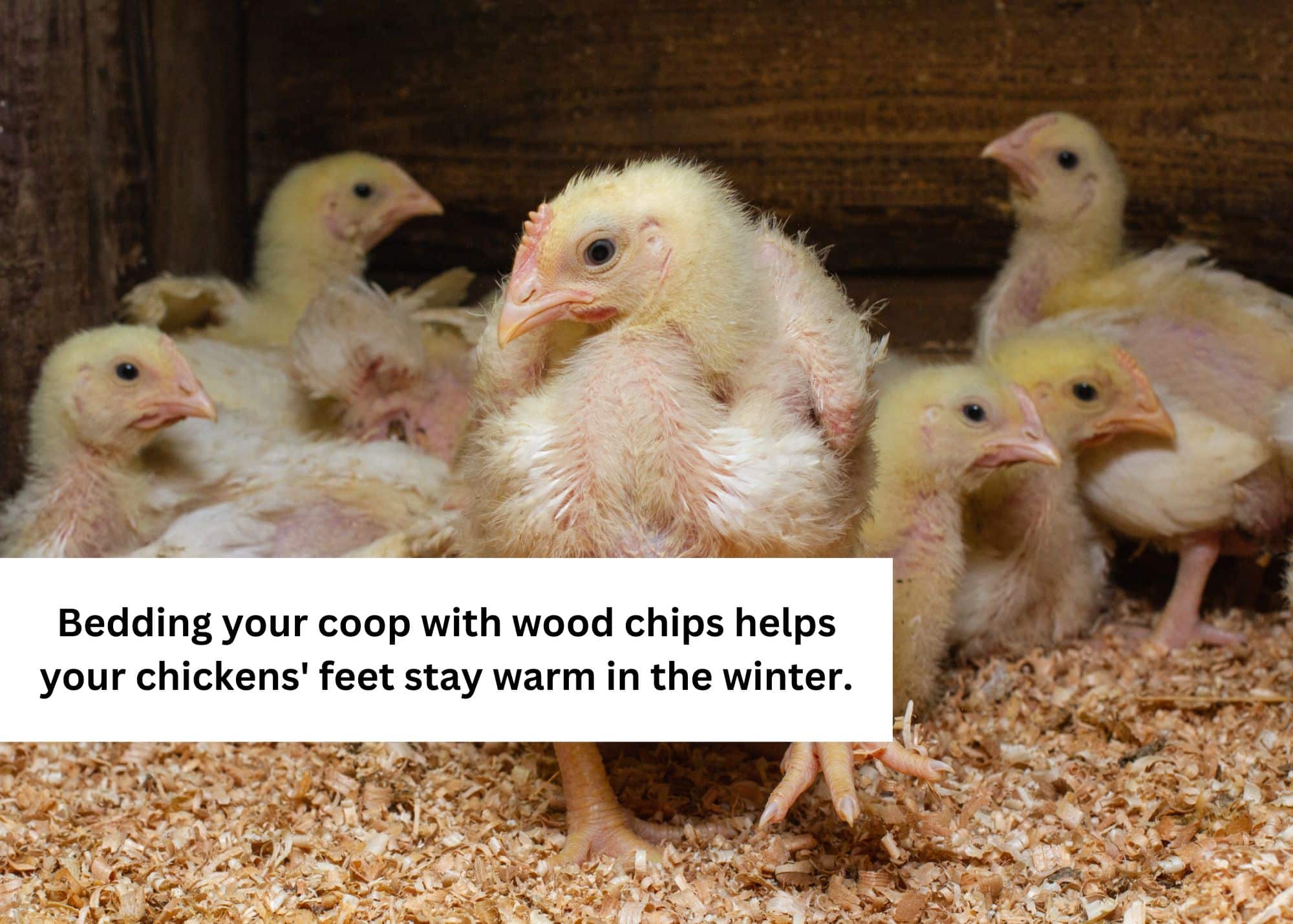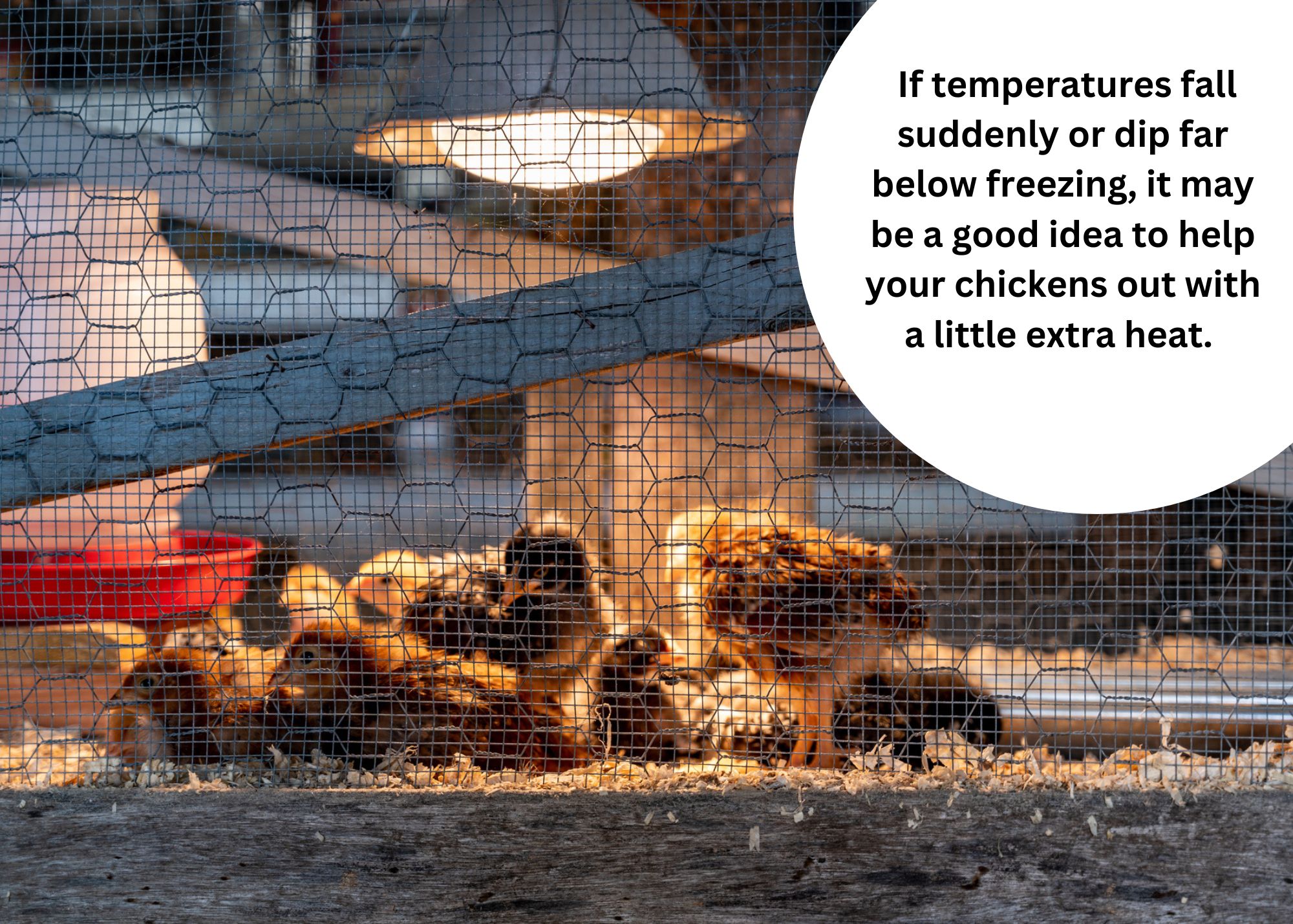Cozy Chickens: Preparing Your Flock for a Comfortable Winter
Whether you want to eat healthier, support soil health, or give your kids a job to do, owning a flock of chickens is a fantastic idea!
Maybe that’s why so many people have taken the plunge and bought a backyard coop and a few chicks. If that’s your story, kudos to you!
As your little fuzzies grow into a beautiful flock of laying hens that strut around your property, making your heart proud.
But then, as you roll along caring for your flock, the days start getting cooler. Suddenly you panic as a sudden thought strikes you…”Wait, how do I keep my chickens alive during the winter? Will they freeze? Do I need a heated coop? Or little chicken sweaters? What about their feet in all the snow and ice?”
Panic!
At The Mobile Chicken House, we are chicken farmers with plenty of experience in keeping chickens during winter, and it really isn’t too tricky. (So don’t panic!) In this article, we are going to tell you all about it.
So let’s get started!
Table of Contents
6 Steps To Winterizing Your Coop
Before we start, let’s get something straight.
Chickens are better at surviving cold temperatures than you may think. They have natural down coats that keep them toasty, and their bodies adapt as the days get cooler. Also, like all animals, they have instincts that help them survive changing seasons.
Just think about all the blue jays, cardinals, and chickadees that stick around during the winter and thrive–all without you running out with heat lamps and little bird sweaters for them!
Like wild animals, chickens are pretty well equipped to survive winter. However, taking care of your flock is a responsibility, and in cold environments, chickens will need some assistance to really thrive. So let’s talk about some steps you can take to give them a boost.
For starters, here’s how you can winterize your chicken coop before the snow sets in:
1 - Give it a deep clean
The first step to winterizing your coop is a good cleaning.
It’s best to head into the winter months with a clean coop, as chickens spend more time there during the winter, and the mess can build up quickly. Plus, nobody wants to clean their chicken coop in 25-degree weather any more than absolutely necessary! You’ll thank yourself for starting out with a clean coop.
Be sure to provide a good, thick layer of bedding for your birds to insulate their feet from the cold ground and prevent frostbite. You may even want to consider using straw for bedding during the winter, even if you normally use sawdust or wood shavings. Straw is an excellent insulator because of its hollow structure and helps keep your birds warm.
2 - Insulate your coop (but don’t OVERinsulate)
Insulating your backyard chicken coop is a good idea, primarily if the sides are mainly wire mesh. You can use hardware cloth, plexiglass, tarps, or other materials to cover the mesh and provide a wind block/insulation. You can also bed your coop with wood chips which helps chickens’ feet stay warm.

However, your coop doesn’t need to be completely airtight–it just needs to be enclosed and somewhat insulated so the wind doesn’t whistle straight through. Your chickens need shelter from the wind and the bitterest cold, but they don’t need their coop to be as warm as your house.
In fact, keeping your chickens too warm prevents them from adapting to the cold temperatures outside. That is why heating your coop can be a bad idea. Often, the heat your flock generates is enough to keep the space warm, and while you may need a bit of supplemental heat in extreme conditions, you generally don’t need to heat your coop.
3 - Ensure ventilation
Your chickens spend more time in their coop during the winter, and conditions can quickly get damp, messy, and smelly. That is why your coop needs to have adequate ventilation.
Lack of ventilation causes ammonia buildup, dampness, and a perfect environment for disease. For your chickens to thrive, you need proper ventilation that keeps your coop dry and comfortable.
To properly ventilate your chicken coop, you want openings near the top so air can circulate above your chickens’ heads. Avoid openings near the bottom, on a level with the roosts or below, as those create drafts that could bother your chickens.
4 - Create a wind block
It’s a good idea to provide your chickens with a semi-sheltered outdoor area where they can get some exercise, fresh air, and sunlight. If the area receives a lot of wind, you may want to consider creating a wind block for your exposed chicken run area.
5 - Get a de-icing solution
Trying to keep water unfrozen during the winter is always a losing battle against Mother Nature. It’s worth investing in a heated water bucket or similar solution to keep your water effortlessly unfrozen.
Trust us! You’ll thank yourself when you trudge out to care for your chickens on a 25-degree day and don’t need to chip a solid block of ice out of the watering container!
You may also want to consider investing in other equipment, such as:
- Cozy nesting boxes
- Automatic feeders
- Automatic lighting
Equipment such as automatic feeders and waterers means you can cut down on your treks to the chicken coop, which means less time out in the cold and more time inside by your fireplace!
6 - Have a plan for providing supplemental heat
Like we said, you don’t need to heat your coop all the time. But if temperatures fall suddenly or dip far below freezing, it may be a good idea to help your chickens out with a little extra heat.

If you do add some heat to your coop, make sure it’s safe. Dry straw, curious chickens, and electrical wiring can be a recipe for disaster.
When set up correctly, heat lamps can be perfectly safe. You can also pick up safe space heaters like this one if you really want to invest in a good solution.
It’s also a good idea to make your heat source “optional” for your chickens. For example, put a heat lamp at one end of your coop but let the other end unheated so that if your chickens get toasty, they can escape the heat.
Another option is to pull your chicken coop into a larger building, such as a garage or storage building, if conditions get extreme.
Caring For Your Flock During Winter
We’ve talked about what you can do to your chicken coop to make it a cozy home for your flock all winter.
Here are a few more things you can do for your feathered friends to keep them happy all year:
1 - Watch for signs of frostbite
It can take as little as ten minutes of sub-freezing temperatures to cause frostbite in chickens, and it is worst in the unprotected feet, comb, and wattle. Frostbite causes these areas to swell, turn black, and, in extreme cases, even fall off.
- Make sure your chickens have access to areas that are above freezing.
- If your chickens are outside, make sure they have access to stumps, roosts, or other places where they can get their feet off the frozen ground.
- Watch for signs of frostbite.
The most important thing to think about when trying to prevent frostbite is to keep your chickens dry and out of the wind. Chickens can handle a lot if they are dry and out of the direct wind, but if conditions are damp and windy they’ll suffer.
2 - Provide adequate light
Hens need about 14 hours of daylight per day to lay eggs. They are biologically designed to stop laying during the winter and start again when days get longer in spring, so chicks hatch in spring and mature over summer.
However, if you want your hens to keep laying all winter, you can install lighting in your coop to simulate daylight. This can stimulate the hens to keep laying.
This article by Michigan State University on decreasing daylight and its effect on laying hens outlines some of the best ways to provide lighting for your hens during the winter.

3 - Gather eggs quickly to prevent freezing
If left exposed in winter, eggs can freeze and crack. And since eggs become more precious during the winter months, when hens don’t lay as well, you probably don’t want to waste any!
One of the best ways to prevent your eggs from freezing and being wasted is to gather them often, especially before temperatures drop in the evenings, so they don’t have time to freeze. Insulating your nesting boxes with straw and cardboard can also help keep them unfrozen for longer.
The Bottom Line
So what’s the bottom line on chickens and winter?
Keeping your flock healthy and happy all year is not that difficult. Ensure your coop is insulated but not over-insulated, keep it ventilated, and provide plenty of fresh water and feed.
Beyond that, use your common sense and all should be well. Above all, stay alert and watch your flock for signs of distress. You’ll likely be able to tell if your flock is thriving or not.
We wish you and your feathered friends all the best!
At The Mobile Chicken House, we have years of experience raising and wintering chickens and have found a few ways to make life easier for chicken owners.
That’s why we manufacture mobile coops that promote healthy behaviors in your flock. We manufacture both large mobile coops for commercial operations and small backyard coops.
A few of our coops include:
- Backyard Alumi-coops
- Mobile Chicken Houses
- Mobile Broiler Houses
- Portable Chicken Coops
- 2-Tier Community Nests
If you want a happy, healthy flock, check it all out on our website today!


